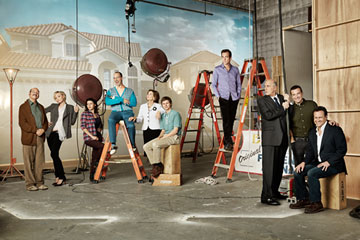
On set with the cast of Arrested Development.
(4 of 6)
Whether it's the last or not--no one's saying never but there are no plans for a follow-up--Season 4 will be very different from the previous three. Rather than jump between stories, each episode will focus on one character; most episodes will involve some but not all of the nine principals. That's partly a function of scheduling, but it also made the new episodes "less about the story and more about their inner lives," Hurwitz says. (For now we can only take his word for it; Netflix is not screening the episodes for critics to review.)
Above all, the Netflix experiment let Hurwitz ratchet up the show's labyrinthine complexity. Traditional TV is linear: one thing happens one week, and a new thing happens the next. But just as these episodes' release will be simultaneous, so will their stories, which bring each character from 2006 to the present. They'll overlap and interconnect. A character shows up in one episode with a black eye. How did he get it? You'll find out in another episode. A setup might appear in one episode and the punch line in another. This might be baffling if viewers had to wait a week between episodes, but here they can watch--or, Netflix hopes, rewatch--at their own pace, in any order.
If that sounds like a puzzle for viewers, actually making the damn thing was, for Hurwitz, like solving a Rubik's Cube in his head. To keep the story straight, his writers' room had a bulletin board with plot points on index cards, à la Claire Danes' big wall of crazy in Homeland. Events were linked with different-colored yarn: "simultaneous string" (i.e., "this thing happens when this other thing does") and "causal string" ("this thing happens because this thing did").
A change in one episode meant changes in others. As Hurwitz says, "I filled in more of the crossword in ink." Production had to be both meticulously planned and highly flexible. The initial 10-episode order somehow mushroomed to 15. As producer John Foy puts it, "Mitch's genius is a blessing and a curse."
It isn't always a picnic for his actors, either, who often find themselves saying lines whose motivation will be revealed in a later, yet-unwritten script or waiting for dialogue to be rewritten on the spot. At one point during my visit, Hurwitz halts the shoot after a rehearsal, calls for a MacBook and retypes the entire scene, speaking the lines aloud with varying emphases, tightening, microtuning. (For the current scene, in which Michael is disparaging his family company's houses, "Why would you buy one of these pieces of--the American Dream?" becomes "Why would you buy one of these pieces of sh--short-term investments?")
Finally Hurwitz stops typing, nods and hands the open laptop to an assistant, who runs to the production office to print new copies. Apparently this happens a lot. "At a certain point," says co-star David Cross, "I wouldn't bother memorizing my lines."
